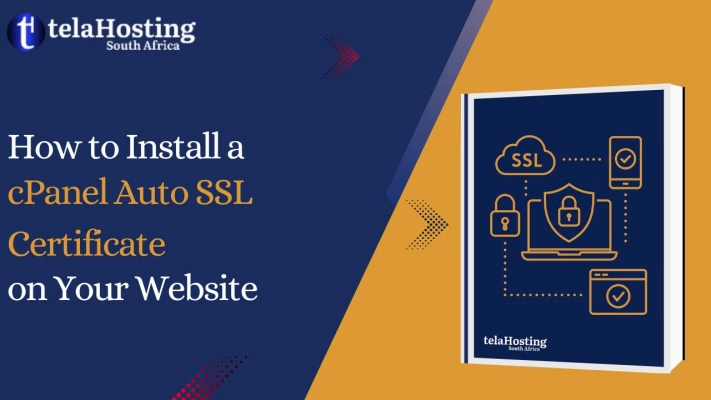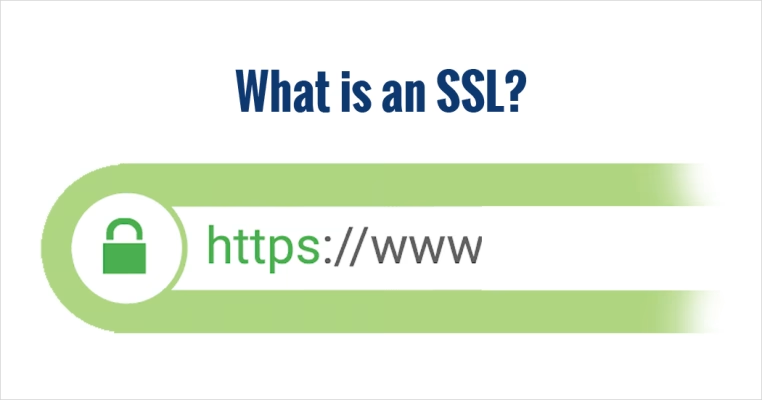
In South Africa’s booming digital economy, where e-commerce and online services are expanding rapidly, securing your website is no longer optional, it’s essential.
With cyber threats on the rise and regulations like the Protection of Personal Information Act (POPIA) emphasizing data protection, an SSL certificate ensures that sensitive customer information remains encrypted and safe from hackers.
Imagine losing customer trust or facing hefty fines because your site lacks proper security. Whether you’re running a small business in Johannesburg, an online store in Cape Town, or a blog in Durban.
Installing an AutoSSL certificate via cPanel can safeguard your .za domain, boost SEO rankings on Google.co.za, and enhance user confidence. The best part? AutoSSL automates the process, making it hassle-free for non-technical users.
AutoSSL, provided by cPanel, automatically installs and renews free SSL certificates for your domains, eliminating the need for manual intervention. This guide, tailored for South African website owners, will walk you through the installation process step by step. We’ll cover everything from understanding SSL to troubleshooting common issues, ensuring your site complies with local laws and performs optimally. If you’re hosting with a reliable South African provider like TelaHosting, which offers seamless cPanel integration, you’re already on the right track. Let’s dive in and secure your online presence before vulnerabilities strike.
Understanding SSL Certificates
Before we get into the installation process, it’s crucial to grasp what an SSL certificate is and why it matters.
SSL, or Secure Sockets Layer (now often referred to as TLS — Transport Layer Security), is a protocol that encrypts data transmitted between a user’s browser and your website’s server. This encryption prevents hackers from intercepting sensitive information like login credentials, payment details, or personal data.
In South Africa, where internet penetration has surpassed 50 million users in 2025, websites handling personal information must align with POPIA. While POPIA doesn’t explicitly mandate SSL, it requires “appropriate, reasonable technical and organisational measures” to protect data. An SSL certificate is a key part of this, as it helps prevent data breaches that could lead to fines up to R10 million. Moreover, Google prioritizes HTTPS sites in search results, giving your .za domain a local SEO boost.
Types of SSL Certificates
There are several types of SSL certificates, each suited to different needs:
- Domain Validation (DV) SSL: The most basic, verifying only domain ownership. Ideal for blogs or small sites.
- Organization Validation (OV) SSL: Verifies the organization behind the domain, offering higher trust.
- Extended Validation (EV) SSL: The highest level, displaying a green padlock and company name in the browser.
- Wildcard SSL: Covers subdomains, perfect for larger sites like e-commerce platforms.
For South African businesses, starting with a free DV certificate via AutoSSL is often sufficient, but consider upgrading for enhanced credibility.
Benefits of SSL for South African Websites
Implementing SSL offers numerous advantages:
- Enhanced Security: Protects against man-in-the-middle attacks, common in public Wi-Fi hotspots across SA.
- SEO Advantages: Google.co.za favors secure sites, improving visibility in local searches.
- Customer Trust: The padlock icon reassures users, reducing cart abandonment in e-commerce.
- POPIA Compliance: Demonstrates commitment to data protection, avoiding regulatory scrutiny.
- Performance Boost: Modern protocols like HTTP/2 require SSL for faster loading times.
Without SSL, browsers display “Not Secure” warnings, deterring visitors. For .za domains, SSL also aligns with ZADNA guidelines for secure online identities.
Why Use AutoSSL in cPanel?
cPanel’s AutoSSL feature simplifies SSL management by automatically provisioning, installing, and renewing certificates from providers like Let’s Encrypt or Sectigo. This is particularly beneficial for South African users, where hosting costs and technical expertise can be barriers for SMEs.
Unlike manual installations, AutoSSL runs in the background, checking domains daily and renewing certificates before expiration. It’s free with most cPanel hosts, making it accessible for startups in Pretoria or enterprises in Bloemfontein. TelaHosting, a leading SA provider, includes AutoSSL in all plans, ensuring compliance with local data laws. For more on AutoSSL providers, check cPanel’s official documentation here.
AutoSSL vs. Manual SSL Installation
Manual installation involves generating CSRs, purchasing certificates, and configuring servers, time-consuming and error-prone. AutoSSL automates this, but it’s limited to DV certificates and requires proper domain setup. For advanced needs, manual options might be better.
Prerequisites for Installing AutoSSL
Before installation, ensure your setup meets these requirements:
- cPanel Access: Your host must provide cPanel (version 78+ for full AutoSSL support).
- Domain Resolution: Your .za domain must point to the server’s IP via DNS records.
- No Conflicts: Remove any existing self-signed or expired certificates.
- Hosting Plan: Confirm AutoSSL is enabled; TelaHosting users can check via support.
- POPIA Readiness: Update your privacy policy to reflect secure data handling.
Step-by-Step Guide to Installing AutoSSL
Now, let’s walk through the installation process. This assumes you have cPanel access; if not, contact your host like TelaHosting.
1. Log In to cPanel
Access your cPanel dashboard by navigating to yourdomain.co.za/cpanel and entering your credentials. For security, enable 2FA.
2. Navigate to SSL/TLS Status
In the Security section, click “SSL/TLS Status.” This interface lists your domains and their SSL status.
3. Select Domains for AutoSSL
Check the boxes for domains you want to secure. For .za sites, include all subdomains. Click “Include during AutoSSL” if needed.
4. Run AutoSSL
Click “Run AutoSSL.” cPanel will validate domains, request certificates, and install them. This may take a few minutes to hours, depending on the provider.
5. Verify Installation
Return to SSL/TLS Status to confirm the green padlock. Test your site at SSL Labs for an A+ rating.
6. Force HTTPS
To redirect HTTP to HTTPS, add code to your .htaccess file or use a plugin like Really Simple SSL for WordPress sites.
Troubleshooting Common AutoSSL Issues
If AutoSSL fails, common errors include:
- Domain Not Resolved: Fix DNS propagation (up to 48 hours for .za domains).
- Rate Limits: Let’s Encrypt limits; wait or switch providers.
- Conflicts: Remove old certificates via SSL/TLS Manager.
Check logs in WHM or contact support. For detailed troubleshooting, see cPanel’s AutoSSL Check Script.
Best Practices for Maintaining SSL on .za Domains
Post-installation, follow these tips:
- Regular Monitoring: Use tools like Google Search Console for alerts.
- Renewals: AutoSSL handles this, but verify quarterly.
- Mixed Content Fix: Update all resources to HTTPS.
- POPIA Integration: Include SSL in your data protection policy.
- Upgrade if Needed: For e-commerce, consider OV/EV from providers like Domains.co.za.
For more on .za best practices, read Register Domain’s guide.
Case Studies: SSL Success in South Africa
Takealot uses SSL to secure transactions, complying with POPIA and boosting trust. A small Durban SME saw 20% traffic increase post-SSL via cPanel.
FAQs About AutoSSL Installation
Q: Is AutoSSL free? Yes, with cPanel hosts like TelaHosting.
Q: How long does installation take? Typically 5-30 minutes.
Q: Does it work for .za domains? Absolutely, as long as DNS is set up.
Conclusion
Installing a cPanel AutoSSL certificate is a straightforward way to secure your South African website, enhance SEO, and ensure POPIA compliance. By following this guide, you’ll protect your data, build trust, and stay ahead in SA’s digital landscape. Don’t delay, secure your site today with TelaHosting’s cPanel plans.
For more tips, check our blog on Top 10 cPanel Web Hosting providers in South Africa
